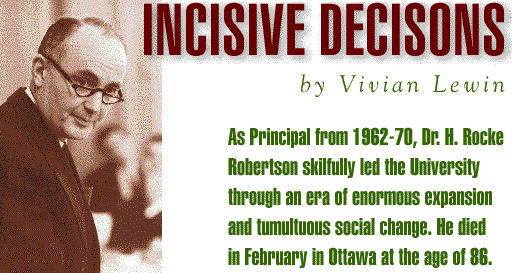
If we were teleported back to the McGill of F. Cyril James, we would scarcely recognize it. None of the governing structures we take for granted -- an active Senate and a representative Board of Governors -- were in place. James ran McGill like a medieval fiefdom," says history professor Faith Wallis, BA'71, MA'74, MLS'76, a medie-valist herself, in describing the University inherited by James's successor, Harold Rocke Robertson, BSc'32, MD'36. "Robertson shaped that McGill into one that would feel familiar to us today."
The man who became McGill's 12th Principal was born in 1912 in Victoria, B.C., to a family where law was the profession of choice. But Robertson chose medicine and McGill, where the foun-der of modern medicine, Sir William Osler, MD1872, had launched his famous career and deposited not only his personal library, but a vast intellectual legacy. In this climate, Robertson acquired his lifelong love of old books and an enduring spirit of inquiry into the art and science of medicine.
Graduating at the top of his medical class, he went on to train as a surgeon in Montreal and Edinburgh, and his service during World War II with the 2nd Canadian Surgical Unit left him fascinated with the causes and treatment of infection in wounds. His writings and research on this subject won him the Lister Prize from the University of Edinburgh.
After the war, he moved to Vancou-ver to help found the University of British Columbia medical school. In 1959, he came back to McGill to chair the University's Department of Surgery and take up the post of surgeon-in-chief at the Montreal General Hospital. Former students remember Robertson's bedside teaching as extraordinary.
"He had a way of looking directly at every person he encountered, and treating them with total respect," recalls Dr. Fred Wiegand, BA'56, MD'60, MSc'64. "Some doctors could really make a student feel small. But when one of Dr. Robertson's students asked a question that was less than intelligent, he always answered it in a way that left you retaining some dignity. I tell you, you were so grateful you were ready to be the man's slave for life!"
At the General, he recruited several basic scientists to augment research activity, developed the Trauma Team -- based on a model acquired during his military days -- and established one of the first intensive care units in Canada. During the same period, he served as director of McGill's Graduates' Society and took on the job of chair of the Alma Mater Fund.
In 1962, Robertson left his distinguished surgical career to become Principal and Vice-Chancellor of McGill. Albert Tunis, BA'48, was editor of the McGill News during Robertson's tenure and recalls David Thomson, then dean of graduate studies and research, quipping that Robertson had exchanged making "decisive incisions" for making "incisive decisions."
His first challenge was to orchestrate the funding needed for McGill's unprecedented expansion. Until 1963, McGill had conducted itself as a private university, but now the "Quiet Revolu-tion" was under way and Quebec, which was for the first time contributing significantly to McGill's building program and its operating budget, still expected the University to use its own funds first. Robertson battled with the province over its policy of "rattrapage," whereby most government funding went to francophone universities to enable them to "catch up" to McGill and the other English-language institutions.
Robertson's eight-year tenure saw McGill gain many of the physical and administrative structures it had lacked. Even so, it barely kept up with the pace of change. The student body increased by 70 per cent as baby boomers swelled enrolment, and the full-time teaching staff more than doubled. McGill acquir-ed a Faculty of Management, and the physical plant quadrupled with the construction of 16 new buildings. Student representatives, meanwhile, clamoured for changes to the way McGill was governed. Eventually, they were invited to sit on the Board of Governors, Senate and many key subcommittees.
But these changes didn't come peacefully and when McGill, after several years of deficit financing, raised tuition $100 a year in 1966-67 -- from $535, already the highest in Canada -- McGill students, like their counterparts all over North America, rebelled with bomb threats, sit-ins and mass demonstrations.
Robertson seemed to possess the right blend of toughness and patience. According to Professor Wallis, "Repression was not his style. He was proud, calm, almost Olympian. He was legitimately averse to over-reacting, and so preserved the dignity of the University." Adds Wallis, "I think McGill would have suffered greater turmoil had he not been at the helm."
A lover of books and an enthusiastic collector, he played a major part in building the facilities of the Faculty of Medicine's Osler Library, whose rare book room now bears his name. He presented the library with a princely gift from his personal collection -- a set of the renowned 18th century Encyclopédie by Diderot and d'Alembertin, its original bindings still intact.
Robertson is survived by his wife of 61 years, Beatrice Rosalyn Arnold, who created the medicinal herb garden near the McIntyre Medical Sciences Building, and their four children, Tam, Ian, Bea and Stuart, plus nine grandchildren and two great-grandchildren.
|